Oct . 17, 2024 03:18 Back to list
best kit for h pylori supplier
The Best Kits for H. Pylori Testing A Comprehensive Guide
Helicobacter pylori (H. pylori) is a type of bacteria that can inhabit the stomach lining and is often associated with various gastrointestinal conditions, including peptic ulcers and chronic gastritis. The presence of H. pylori can lead to severe health issues, which makes accurate and timely diagnosis crucial. To aid healthcare professionals and individuals in detecting this bacterium, several testing kits have been developed, each with its unique features and benefits.
When looking for the best kits for H. pylori testing, it’s essential to consider factors such as accuracy, ease of use, and the type of testing methods available. Commonly used methods include breath tests, blood tests, stool antigen tests, and endoscopy with biopsy. Among these, non-invasive tests like breath and stool antigen tests are gaining popularity due to their ease of administration and quick results.
Types of H
. Pylori Testing Kits1. Urea Breath Test Kits One of the most reliable non-invasive tests is the Urea Breath Test (UBT). The test involves the patient ingesting a special urea-containing substance labeled with carbon isotopes. If H. pylori is present in the stomach, it will metabolize the urea, producing carbon dioxide that can be measured in the breath. This method boasts high sensitivity and specificity, making it a go-to choice for many healthcare providers.
2. Stool Antigen Test Kits Stool antigen tests detect H. pylori proteins in a stool sample. These kits are straightforward and involve collecting a stool sample, which is then tested for the presence of H. pylori antigens. The results typically come quickly, usually within a day, providing a reliable diagnosis for the presence of the bacteria.
best kit for h pylori supplier

3. Serology Test Kits Blood tests can detect antibodies against H. pylori. While this method is easier to perform, it may not always provide the most accurate results, particularly in chronic infections where the body may have built up antibodies. Additionally, it is not suitable for confirming eradication after treatment.
4. Endoscopy with Biopsy Kits For cases requiring more detailed investigation, endoscopy may be recommended. In this invasive procedure, a physician uses a thin tube with a camera to visualize the stomach lining and collect tissue samples for laboratory analysis. This method is typically reserved for severe cases or when other tests are inconclusive.
Choosing the Right Supplier
Selecting a reliable supplier for H. pylori testing kits is equally important as choosing the right type. Reputable suppliers should offer high-quality, validated kits that comply with international standards. Research suppliers' certifications, customer reviews, and the availability of technical support to ensure you are getting the best product for your diagnostic needs.
In conclusion, the key to effective H. pylori diagnosis lies in understanding the various testing options available and selecting the best kits that suit your requirements. By considering the type of tests and their reliability, along with partnering with a trusted supplier, healthcare professionals can improve patient outcomes and ensure more effective management of H. pylori-related conditions.
-
Pregnancy Test Calculator: Know Your Weeks, Week by Week
NewsAug.22,2025
-
Malaria Pf Ag Rapid Test Kit - Quick & Accurate Detection
NewsAug.11,2025
-
Accurate Cardiac Marker CK-MB Rapid Test for Quick Results
NewsAug.10,2025
-
Premium Empty ABS Plastic Cassette for Test Strips
NewsAug.09,2025
-
Sterile Urine Cup: Accurate Specimen Collection for Labs & Home
NewsAug.08,2025
-
Malaria Pf/Pan Ag Rapid Test Kit for Fast, Accurate Diagnosis
NewsAug.07,2025

